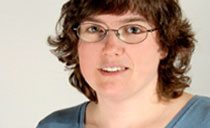Dr Sylvie Lesage
Centre de Recherche
5415, De l’Assomption boulevard
Montréal, QC H1T 2M4
Biographical Sketch
Sylvie Lesage obtained her BSc degree in Immunology at McGill University in 1995. She subsequently completed a 4-year PhD program in Experimental Medicine under the supervision of Dr Patrice Hugo, where she acquired expertise in central T cell tolerance mechanisms. From 1999 to 2002, she pursued her post-doctoral training in the world-renowned laboratory of Dr Christopher C. Goodnow in Australia. There, she attempted to understand the concepts of T cell tolerance in type 1 diabetes. By using various mouse models she showed that mice developing disease exhibited defects in T cell tolerance and she undertook the characterization of these defects at a molecular and genetic level. From 2003 to 2005, she completed a second post-doctoral training under the supervision of Dr Marika Sarfati in Montreal. During that training period, Dr Lesage was exposed to human immunology and learned to transpose knowledge from mouse to human.
Since September 2005, Dr Lesage was appointed as Assistant Professor at the University of Montreal and was promoted to Associate Professor, in June 1st 2010. She has established her research laboratory at the Maisonneuve-Rosemont Hospital. Her main research interest is aimed at restoring the immune balance to prevent the onset or abrogate the progression of type 1 diabetes.
Research Interests
Our research goals are aimed at defining homeostatic regulation of cell populations composing the immune system and to identify their impact on the susceptibility of complex genetic diseases such as autoimmune diseases and cancer.
In particular, we study variations of T cell and dendritic cell sub-populations in various strains of mice. The ultimate goal is to increase our understanding of the cellular population dynamics in the immune system. This research will provide the basis for cellular therapy protocols aimed at restoring the immune balance to prevent the onset or abrogate the progression of various auto-immune diseases and lymphoid cancers.
Technologies: congenic and transgenic mice, cellular immunology, multiparametric flow cytometry, genetic association studies of polymorphisms.





